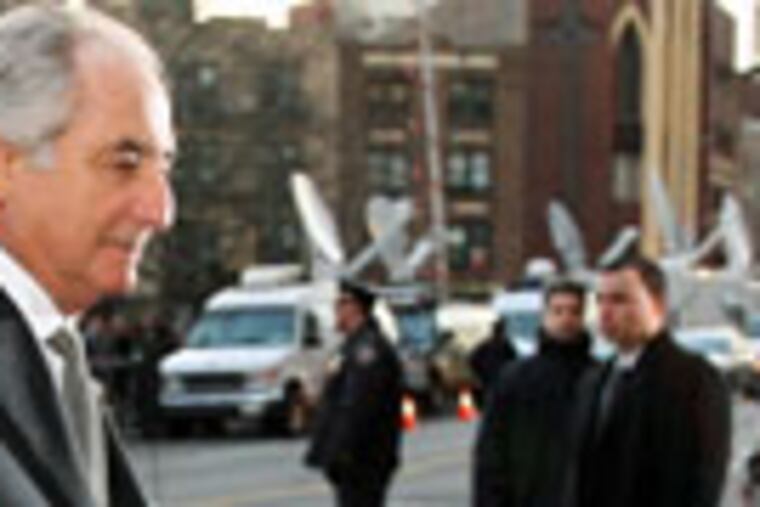Ruling in Madoff case could affect Forte victims
A federal judge in Manhattan is scheduled to hear arguments Friday in a $700 million fight between the trustee for victims of Bernard L. Madoff's Ponzi scheme and the owners of the New York Mets.

A federal judge in Manhattan is scheduled to hear arguments Friday in a $700 million fight between the trustee for victims of Bernard L. Madoff's Ponzi scheme and the owners of the New York Mets.
The trustee, Irving Picard, has demanded that the Mets owners, Fred Wilpon and Saul Katz, return $700 million in principal they withdrew from Madoff's fund over six years, alleging that they were willfully blind to evidence that Madoff was a fraud.
Judge Jed S. Rakoff's eventual decision on the Mets owners could have implications for the 125 investors in Joseph S. Forte's Ponzi scheme, which collapsed in late 2008 amid a stock-market rout and Madoff's implosion. Forte's investors, many from the Main Line, lost almost $35 million.
Like Picard, the receiver in the Forte case, Marion A. Hecht, wants to recoup withdrawn principal from investors who allegedly should have recognized that something was amiss in Forte's operation, which sent typewritten statements on paper with no letterhead and never had a losing quarter.
The decision by Rakoff, of U.S. District Court for the Southern District of New York, does not create precedent in the Eastern District of Pennsylvania. "But that's not to say that a well-reasoned opinion wouldn't have some influence on a sitting judge," said Frank A. Mayer III, a Philadelphia partner at Pepper Hamilton L.L.P.
Wilpon and Katz want Rakoff to dismiss Picard's complaint, arguing that Picard's claims of "willful blindness" are false or immaterial.
In addition, Picard seeks $300 million in so-called fictitious profits - withdrawals beyond the principal invested - from Wilpon and Katz. That demand gained support Tuesday in a ruling by a three-judge federal appeals court that Picard's formula for recovering and redistributing assets was valid.
Given the difference in scale, the frauds by Madoff and Forte, who lived in Broomall and was a computer salesman before turning professional investor in 1995, had little in common. But they shared an ability to endure for years by bringing in a steady stream of new money - to pay off earlier investors - through word-of-mouth recommendations among people who trusted one another.
As of last month, according to a statement on his website, Picard had recovered more than $8.6 billion, or about half the $17.3 billion in principal deposits that were lost in Madoff's scheme by customers who filed claims. That was less than one-third of the $64.8 billion shown on final statements from Madoff.
By contrast, Hecht, the Forte receiver, had recouped just $1.9 million of the $26.2 million in principal lost by Forte investors in her first two years, and nearly half of that, $945,184, went to pay Hecht and her lawyers.
A big target for Hecht is approximately $8 million from 41 investors who withdrew more money than they invested. That will defray the losses of the 35 investors who put in $15.2 million and lost all of it.
But Hecht intends to go further than simply recouping net winnings. In evaluating investor claims, Hecht plans to put investors under a microscope, spending more effort on those with larger claims, to "determine each investor's state of mind regarding the fraud," says her proposal for claims resolution.
The goal is to create three classes of investors, each of which would be treated differently in the ultimate settlement of the Forte estate.
Those who were in on the fraud would get nothing.
Those who saw red flags in Forte's operation, that the returns were too good to be true, spurring them to investigate, would get nothing unless they repaid the money withdrawn after they allegedly should have known better. This group could include people who lost money.
Investors deemed completely innocent would get their full share of any distribution from the estate.
Two investor groups weighed in on Hecht's proposal this month, arguing that Hecht's plan would violate Pennsylvania law, which protects investors who acted in "good faith," and waste the little money likely to be available for investors.
U.S. District Court Judge Paul S. Diamond, who is overseeing the receiver's activities in the Forte case and who last year made it clear that he wanted the receiver to investigate whether investors acted in good faith, has not yet scheduled a hearing.